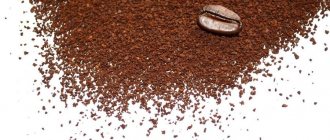Coffee and chicory are fairly common drinks. They both have a proven set of beneficial properties: they reduce the risk of developing diseases of the cardiovascular, digestive and central nervous systems, and increase overall life expectancy. However, drinks differ from each other and have various side effects and contraindications that must be taken into account.
In this article we will compare the pros and cons of coffee and chicory, and also figure out which of them is healthier and which should be preferred in one case or another.
Pros and cons of coffee
Coffee contains large amounts of caffeine, antioxidants and other biologically active substances. The beneficial properties of coffee have been well researched. It activates the nervous system, strengthens the heart and blood vessels, and increases physical and mental performance.
pros
The most striking beneficial qualities of coffee are described below:
- Increased mental and physical performance. It has been proven that coffee improves brain function, leads to an improvement in the overall emotional background, and increases the speed and quality of any tasks performed.
- Reducing body weight. It has been proven that coffee helps you lose weight, since caffeine can speed up overall metabolism and increase the utilization of fat cells from the depot.
- Normalization of glycemic background. According to scientific data, just 1 cup of coffee reduces the risk of developing type II diabetes by 14%, 4 cups – by 30%. The action is based on slowing down the absorption of glucose from the lumen of the digestive tube and increasing the sensitivity of peripheral tissue cells to insulin.
- Prevention of degenerative pathologies of the central nervous system. Scientists say that when consumed regularly, coffee is beneficial for the nervous system, as it reduces the incidence of diseases such as Parkinson's disease, Pick's disease, and Alzheimer's disease. Such deviations lead to rapid disability, loss of labor and social adaptation, and the ability to self-care.
- Preventing cirrhosis. According to American experts, coffee reduces the risk of developing liver cirrhosis caused by various diseases (viral or alcoholic hepatitis, benign and malignant tumors) by 20-80%. For more information on the effect of coffee on the liver, see a separate article.
- Prevention of depression. Surprisingly, coffee is good for depression. It has been proven that when taken regularly, it reduces the severity of anxiety and stress by 20%, and reduces the risk of suicide by 53%.
- Antitumor effect. According to research, drinking 2-5 cups of the drink per day (with long-term consumption) significantly reduces the risk of malignant degeneration of liver cells, mucous and submucous membranes of the large intestine and rectum, and skin.
- Improved cardiovascular health. It has been noted that coffee strengthens the heart and blood vessels, significantly reduces the likelihood of developing coronary heart disease and myocardial infarction, hemorrhagic stroke.
- Preventing gallstone disease. American scientists have found that caffeine reduces the secretion of bile acids into the lumen of the gallbladder and normalizes the motor activity of the entire biliary tract. The combination of the described effects prevents the formation of stones.
- Prevention of gout. Chinese experts have discovered that caffeine slows down the formation of uric acid and accelerates its excretion along with urine. As a result, reliable prevention of the early development of gout and hypertension is ensured.
- Improved gut health . The wide range of antioxidants included in the drink significantly reduces the incidence of inflammatory, autoimmune (Crohn's disease, UC) and malignant proliferative processes in the walls of the digestive apparatus.
- General increase in life expectancy. According to scientists, coffee has an effect on almost the entire human body and reduces the likelihood of developing a wide range of (including life-threatening) diseases. As a result, life expectancy increases as the risk of death decreases.
Thus, coffee, due to the presence of a wide range of antioxidants and caffeine, helps improve the emotional background, prevents the development of many pathologies and increases overall life expectancy.
Minuses
Coffee deficiencies occur (in most cases) as a result of excessive consumption. Below are the most common adverse reactions associated with drinking the drink:
- Increased anxiety and general restlessness.
- Irritability, negative or aggressive attitude towards people and surroundings.
- Dizziness (central).
- Photopsia (goosebumps, dots before the eyes).
- Feeling of palpitations or interruptions in the functioning of the heart muscle (arrhythmia).
- Unpleasant or painful sensations in the calf muscles.
- Addiction. With regular use, caffeine addiction develops. The human body gets used to a “qualitatively new mode of operation.” Scientists say that abruptly giving up coffee can trigger withdrawal symptoms, which also occurs when you limit your intake of cocaine or morphine.
- Sleep disorders. It has been proven that coffee increases the time it takes to fall asleep and makes sleep more shallow.
Coffee has many side effects that should be taken into account before drinking. For example, drinking a drink late can lead to insomnia.
Composition of chicory
All the power of chicory lies in its root. It is in the underground part that a huge amount of substances useful for the human body is concentrated. These include:
- inulin is a polysaccharide that is used as a substitute for classic starch and sugar in foods for diabetics. It also helps normalize the digestive system and improve metabolism;
- glycoside intibin - dilates blood vessels, relieves symptoms of tachycardia, has a beneficial effect on the nervous system;
- sugar;
- resinous and bitter substances;
- tannins - have bactericidal and bacteriostatic properties, kill staphylococcus, typhoid, dysentery and paratyphoid bacilli;
- carotene;
- protein substances;
- vitamin C, E, A, PP, as well as B vitamins (B1, B3, B2);
- pectin;
- salt;
- organic acids;
- fats;
- essential oil;
- macro- and microelements (sodium, calcium, potassium, manganese, iron, phosphorus).
Such a rich chemical composition makes a drink from soluble chicory a “magic potion” that will help maintain not only health, but also youth, beauty and activity.
Pros and cons of chicory
Chicory is an equally popular drink. It is often used as a coffee substitute by people who have certain contraindications.
pros
The main advantages of a drink based on crushed chicory roots include:
- Saturation of the body with valuable nutrients. 60 grams of dry chicory root contains 7% of the daily requirement of manganese, 4% phosphorus, 5% potassium, 3% folic acid, 7% vitamin B6 and 5% vitamin C. It is also important to note that chicory is 11% consists of inulin - a valuable prebiotic necessary to maintain intestinal microbiocenosis and normalize fat and lipid metabolism.
- Normalization of digestive function. Chicory normalizes intestinal microflora (individual populations of microorganisms increase 4-5 times), improves stool consistency, and provides reliable prevention of constipation.
- Preventing colorectal cancer. It has been proven that inulin, due to the suppression of chronic inflammation, prevents the earlier formation of colon and rectal cancer.
- Normalization of glycemic background. The drink, according to Chinese experts, helps increase the sensitivity of peripheral tissues to insulin, which provides fairly reliable prevention of type II diabetes mellitus and other glucose metabolism disorders (fasting hyperglycemia, increased glucose tolerance).
- Increased bone density. American scientists have found that chicory increases the bioavailability of calcium, a key macronutrient that ensures the maintenance of bone mineral density. As a result, the likelihood of developing osteoporosis and bone fractures (especially in old age) is reduced.
- Improved liver health. Chicory root contains chicoric acid, which protects hepatocytes from oxidative damage and improves liver function. Against the background of regular consumption of the drink, there is a decrease in markers of liver cell destruction (ALT and AST), alkaline phosphatase (a symptom of bile stagnation). Chicory can prevent the early development of liver cirrhosis.
- Prevention of cardiovascular diseases. Inulin, which is part of chicory, reduces the concentration of total cholesterol in the blood and its atherogenic fractions (LDL, TAG), thereby reducing the risk of developing atherosclerosis and related complications (coronary heart disease, chronic cerebral ischemia, myocardial infarction, etc. ). Chicory also improves the rheological properties of the blood and can help eliminate edema due to its diuretic effect.
- Improving the course of diseases and conditions . It has been proven that when taken regularly, chicory reduces the severity of pain in the presence of arthritis or osteoarthritis, which makes it useful for older people. The effect is comparable to drugs such as Indomethacin or Meloxicam.
- General increase in life expectancy. Chicory, like coffee, prevents the early manifestation of many deadly diseases, which, of course, has a positive effect on life expectancy. Experiments in this area were carried out on rats and roundworms, and showed good results.
Thus, chicory is a useful product that normalizes the functioning of the cardiovascular, digestive, endocrine, and musculoskeletal systems. When regularly added to the diet, the risk of developing malignant pathologies and early death is reduced.
Minuses
The main disadvantages of chicory include the following:
- Negative impact on the children's body. There is a myth according to which pregnant women can drink chicory instead of coffee. However, it is not. Chicory is strictly forbidden to be consumed during pregnancy, breastfeeding, and for children under 3 years of age. Neglecting this rule can lead to disruption of the child’s development.
- Irritation of mucous membranes. If the oral cavity and digestive system are healthy, chicory is harmless. However, in the presence of inflammatory pathologies (gastritis, duodenitis, gastric and duodenal ulcers, stomatitis), the product aggravates the course of the underlying disease.
- Stimulation of the formation of stones in the gallbladder. Chicory stimulates the secretion of bile into the lumen of the biliary tract and promotes the formation of stones. If there is a history of cholelithiasis, it is contraindicated.
- Allergic reactions. Unfortunately, hypersensitivity to individual components of chicory is extremely common. Cases of cross-allergy have been described.
Chicory is not without its drawbacks. It is not recommended to take the drink during inflammatory diseases of the digestive tube, children under 3 years of age, women during pregnancy, as well as with increased sensitivity of the body.
Excursion into history
According to legend, coffee beans were stored in the royal storerooms of Suleiman the Magnificent. The invigorating elixir was the privilege of crowned heads, but one day the Sultan noticed that his guards were drinking coffee. He initially accused them of theft, but an investigation revealed a different composition of the broth. The guards were preparing an infusion of chicory, which Suleiman liked. There is also an unconfirmed version that the idea of brewing a coffee drink belongs to the Dutch.
- This is interesting: The history of the origin and spread of coffee
Historians have revealed another interesting fact regarding the blockade of Britain by Napoleon in the early 19th century. Due to the ban on the import of goods, the French were deprived of their favorite products, including coffee, the cost of which increased several times. Buyers preferred only natural grains, not wanting to spend money on ground surrogate.
Traders found a way out using a paste from the rhizome of the plant and special molds in which it hardened. After drying, the workpieces could not be distinguished from coffee beans in appearance. The mixture was marketed for a long time as a natural product because no one could tell the difference. The healing properties of the root were described in the works of Dioscorides and Theophrastus; Avicenna used the plant to treat joints and improve digestion. The first mention of chicory infusion in Rus' dates back to 1800, and a plant for the production of soluble raw materials on a natural basis was opened in the second half of the 19th century by an enterprising Frenchman.
- Don't miss: What instant coffee is actually made from
The idea belonged to Alphonse Peru, who decided to simplify the process of preparing the aromatic drink. There was no longer any need to grind and brew grains - just add the thick paste to a cup and add hot water. However, the appearance of the concentrate was so unsightly that the French preferred to spend a little more time getting their usual coffee. Over time, the formula of the composition and the processing of raw materials changed, thanks to which the product gained popularity.
Which is ultimately healthier?
It is impossible to say for sure which drink is more beneficial. Coffee has more pronounced and effective effects, it invigorates better in the morning, is more beneficial for losing weight, and provides reliable prevention of a number of cardiological and endocrine diseases. However, it has an impressive range of side effects, most of which are due to the presence of caffeine, the main active ingredient of the drink.
It is known that chicory does not contain caffeine, therefore, emotional disturbances, depressive disorders, hypertensive crises (with refractory hypertension), etc. do not develop when taken.
If the human body is healthy and has no obvious contraindications, then coffee is a better choice.
If there are abnormalities in the central nervous (sleep disorders), endocrine and cardiovascular systems (drug-resistant arterial hypertension), it is better to drink chicory than coffee.
— Chicory for pregnant women
Many expectant mothers are extremely concerned about the question of whether it is possible to drink a chicory drink while in an interesting position. Not only is it possible, but it is necessary!
It has a good effect on the liver, improves appetite, helps fight heartburn, eases the work of the heart and regulates intestinal functions, and this ensures good health for a pregnant woman throughout the nine months.
Girls also often wonder: is chicory ok for pregnant women? As you know, pregnant women need to drink as much milk as possible, but not everyone can tolerate it in its pure form! There is an exit! Just add chicory powder to milk - tasty and healthy. And thanks to chicory, the digestibility of the drink will increase fourfold.
According to recent research by scientists from Australia, chicory significantly increases the number of red blood cells, cleanses the blood and refreshes its composition. Thus, the child receives many more nutrients, which improves his health and vitality.
Who should replace coffee with chicory?
Chicory can be a good substitute for coffee for the following conditions:
- Ages from 3 to 16 years. You can only drink coffee from 16-17 years of age.
- Any sleep disorders.
- Any pathology of the mental sphere.
- Renal arterial hypertension. Refractory hypertension with frequent crises.
- Glaucoma.
- Smoking. Nicotine enhances the effects of caffeine and increases the risk of side effects, especially addiction.
- Taking antidepressants (Fluvoxamine) and oral contraceptives.
- Iron-deficiency anemia.
- Severe functional failure of the liver and kidneys.
If there are contraindications to coffee, you should completely abandon it and use chicory as a replacement.
Harmful properties of chicory
Speaking about the harm of this plant, one cannot fail to mention its contraindications. In what cases should a chicory drink be consumed with extreme caution, or even abandoned altogether?
- with individual intolerance;
- for various vascular diseases;
- with an increased tendency to allergic reactions. The fact is that the presence of ascorbic acid in chicory significantly increases the risk of allergies, even if you drink the drink in very small doses;
- for hemorrhoids;
- for diseases of the nervous system;
- with gastritis;
- with varicose veins;
- Chicory during breastfeeding;
- This drink is also not recommended for children under three years of age.
As you can see, everything that is written on the packaging of the chicory root drink is absolutely true. Drink instant chicory in small quantities, only in this case it will bring invaluable benefits to your body.
Is it possible to mix drinks and why?
In order to reduce coffee in the daily diet, it is recommended to mix it with chicory, gradually increasing the proportion of the latter.
Initial concentration: 1 part chicory, 3 parts coffee. After 3-4 days - 2 parts coffee, 2 parts chicory, after 1-2 weeks the drink should contain at least 75-80% chicory. After a month, take only chicory.
Such a “slow” transition scheme will avoid the development of withdrawal symptoms and help the body cope with addiction to coffee without harming itself.
To gradually give up coffee, it is recommended to mix it with chicory.
Tandem products
An infusion of the plant's root can act as an independent drink, but it will never become an alternative to brewed grains. Chicory differs from coffee in composition, taste and effect on the body, and people have learned to combine two different products.
Blending is done for several reasons:
- Traditions. In some countries, mixing coffee and chicory has become a habit that is difficult to break.
- Reduced caffeine levels. Chicory remains a popular coffee substitute, and adding it to ground beans reduces the concentration of the stimulant.
- Saving. The root of the plant is several times cheaper than coffee, so the blend reduces the cost of the drink by 15-40%.
You can mix chicory with coffee according to the classic formula in a ratio of 1:4 or 1:2, or create your own recipe based on individual preferences. True gourmets do not welcome such blends. Such blends have advantages, but chicory can significantly spoil the aroma and taste of brewed coffee.
Contraindications
Drinking coffee is contraindicated:
- People with mental disorders.
- For any sleep disorders.
- Persons suffering from diseases of the stomach and duodenum.
- For hypertension.
- For symptomatic arterial hypertension.
- For glaucoma.
- Patients with anemia.
- Patients with liver dysfunction.
- Pregnant and lactating women.
- Children under 13 years old.
Chicory has no medical or age-related contraindications. It is advised to limit its active consumption to people suffering from:
- Stomach ulcer.
- Urolithiasis.
- Asthma.
Which drink is healthier?
It is up to each person to choose: coffee or chicory – which is better. Here, for the most part, everything depends on the individual characteristics of the body, because both drinks have pros and cons. The best option would be to visit a doctor, who, based on your health condition, will confirm which product can be consumed so as not to harm your health.
People who do not have serious health problems are very lucky - they are allowed to drink both chicory and coffee. But you must adhere to the dosage. Doctors say that both drinks can be consumed before four o'clock in the evening in an amount of no more than two cups per day.
Chemical composition and calorie content
The chemical composition is dominated by inulin. During the collection season, up to 75% of the substance can be obtained from chicory root. The composition also contains substances such as: vitamins A, K, C, B, E, B1, B5, B6, B4, B2, PP, potassium, phosphorus, calcium, sodium, magnesium, zinc, manganese, copper, iron and selenium . In addition, it is rich in tannins, resins, phenols, organic acids, coumarin and pectin.
Phenol, which is part of chicory, is not dangerous to the human body.
The content of 100 g of roots is fat - 0.2 g, protein - 1.4 g, carbohydrates - 17, 51 g.
Calorie content - 72 kcal per 100 grams of product.
Reviews
Some people consider chicory as a coffee substitute, while others argue that there is simply no point in comparing these products, since they are completely different. In general, people have different opinions on this issue, because everyone has their own point of view.
Most reviews boil down to the fact that chicory is reminiscent of some kind of drink from childhood, so adults drink it with great pleasure. And if you combine it with milk, it is very similar to coffee. The second drink is most often reviewed by those who drink it exclusively in the morning - people like its effect, although over time it ceases to be so strong.
Based on all of the above, the person himself must decide which drink to drink. Clear recommendations, beneficial and harmful properties presented in the article will help him with this. In general, both products can be consumed, but observing the dosage, since if it is exceeded, you can get negative consequences from any drink.
Varieties
To understand whether drinking chicory instead of coffee is beneficial, you need to know what varieties of the former exist. It varies depending on the type of processing. Currently available for sale: liquid extract, ground root and soluble powder. The very first variety is considered to be the most useful. This is explained by the fact that when obtaining a liquid extract, they do not resort to heat treatment, this allows it to retain all the useful substances. If you prepare a drink from such chicory, the process will be very easy and quick. Other types of product also have their own characteristics:
- Ground and fried. During production, such chicory is subjected to peeling, drying, frying, and also finely chopping the roots. The result is a natural product with a pronounced aroma and taste. Due to the absence of chemical elements in its composition, it has only a positive effect on the human body. In addition, there are many ways to prepare the drink. It is worth noting that the recipe is similar to brewing regular coffee.
- Soluble. The product in powder form is made from a concentrate of roasted and small roots. Here the preparation process simply consists of dissolving the composition in hot water. By the appearance of the product, you can immediately determine that there are no lumps or foreign elements in it. The main thing when storing it is that the jar must be hermetically sealed so that moisture does not get into the powder.
Uses of chicory in other areas
Such a wonderful plant as chicory is widely used in medicine. Due to its unique chemical composition, it has anti-inflammatory, choleretic, diuretic effects; heals wounds, soothes, lowers blood sugar levels.
In folk medicine, all parts of the plant are used: leaves, stem, flowers and, of course, root. There is an ocean of different recipes on the Internet. But we must not forget that the independent use of herbal preparations for medicinal purposes is unacceptable.
We know chicory as a coffee substitute. But nowadays in other countries, it is very popular as a tasty seasoning and a healthy product in dietary nutrition. Coffee with the addition of crushed roasted chicory root has long been one of the favorite drinks of Europeans. Chicory is baked with cheese or with apples; a cold drink is prepared from chicory root with the addition of honey, lemon and apple juice. The stems and leaves of a special variety of chicory (salad) are used in various salads, and young shoots of the plant are boiled or baked in dough.
Chicory is widely used in the confectionery industry for the preparation of baked goods, cakes, candies, and as a natural coloring agent.
Chicory is used not only for preparing healthy and tasty dishes, but also for cleaning household dishes.
Chicory is also used in cosmetology: as part of cosmetics it improves hair structure, strengthens hair roots, protects hair from loss; makes facial skin healthy and beautiful, has an anti-inflammatory and drying effect, helps against acne, rashes and blackheads.
Recipes for drinks with chicory
Instant freeze-dried chicory is sold in stores. If desired, this concentrate can be mixed with natural or instant coffee.
If you want to prepare chicory yourself, you need to dig up the roots in early spring or late autumn and wash them thoroughly. Then cut into small slices crosswise and dry in the oven at +60 °C.
Dried root pieces are fried, stirring constantly, in a dry frying pan until they acquire a rich brown color. During roasting, chicoreol essential oil is formed, the smell of which is similar to the aroma of coffee. Roasted chicory is ground in a coffee grinder and stored in a hermetically sealed jar.
To prepare the drink, pour 2 teaspoons of powder into a glass of water, boil over low heat for 3-5 minutes and leave for another 5 minutes, covered with a lid. The finished broth should be strained. You can add honey, orange or apple juice.
Chicory coffee with milk
Ingredients:
- 1 tsp. freeze-dried chicory;
- 70–100 ml hot water;
- 50 ml milk;
- sugar - to taste.
Recipe:
- Pour the chicory and sugar into a cup.
- Pour in some boiling water and stir vigorously.
- Add the rest of the water.
- Whip the milk until foamy and pour into a cup.











